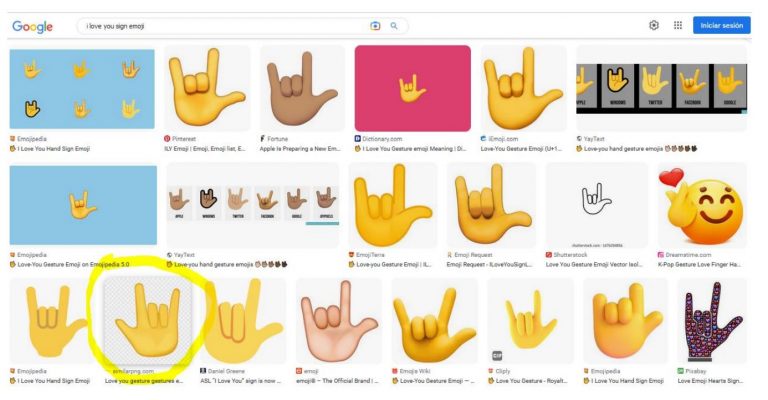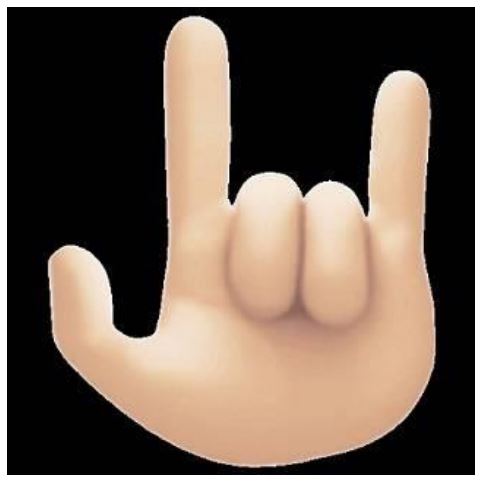European IP Office Denies Trademark Registration for “I Love You” Emoji 🤟
The EU IPO denied a trademark registration for the following symbol in various real estate-related classes:
The trademark examiner determined that the symbol means “I love you” in American Sign Language (ASL). The applicant argued that it was a different symbol because this one is a left-handed symbol, while the ASL symbol is right-handed. The examiner responded that other depictions of this emoji symbol are left-handed too (citing a Google image search):
 [This image search raises some questions for me. First, the search query is “i love you sign emoji,” which is the Unicode title for the symbol. However, that’s not the only descriptor, and I’m not sure if it’s the most common. Others refer to the symbol as “ILY,” and Emojipedia refers to it as the “Love-You Gesture.” Second, there is only one example (the one circled with the highlighter–I guess the examiner lacked a Sharpie?) showing the left-handed sign, and that result is from a URL “similarpng.com” of unknown provenance to me. With just one possibly sketchy result to support the examiner’s claim, I’m not sure how much probative value this screenshot should have.]
[This image search raises some questions for me. First, the search query is “i love you sign emoji,” which is the Unicode title for the symbol. However, that’s not the only descriptor, and I’m not sure if it’s the most common. Others refer to the symbol as “ILY,” and Emojipedia refers to it as the “Love-You Gesture.” Second, there is only one example (the one circled with the highlighter–I guess the examiner lacked a Sharpie?) showing the left-handed sign, and that result is from a URL “similarpng.com” of unknown provenance to me. With just one possibly sketchy result to support the examiner’s claim, I’m not sure how much probative value this screenshot should have.]
Based on this screenshot, the appellate board concludes that “the public can certainly perceive the sign that is the subject of these proceedings as the ‘I Love You’ Emoji.’…It is not decisive whether it is carried out using the right or left hand.”
[For more on the “I love you” emoji, including its overlap with the “sign of the horns,” see the Dictionary.com entry.]
The board then explains some general concerns about registering emojis (note: this translation came from the EU IPO website, but I’m not sure if it was automatically generated):
the main function of an emojis is to provide emotional references which are otherwise lacking in tilted entertainment. Emojis therefore function as a parallel language, which convey a nuanced meaning and make it easier to express feelings. They are often connected with positive communication. As a rule, they are not perceived as an indication of origin.
That last sentence was unclear to me. Was the board saying that consumers could NEVER perceive emoji symbols as indicators of origin, or that there was a rebuttable presumption to that effect?
The board seems to suggest the former:
the average consumer is accustomed to a large number of pictograms such as emblems and emojis which represent emotions and are generally used in private communication to express generally positive feelings, such as joy, consent, enthusiasm or happiness. Such pictograms (including emojis) are perceived by the relevant public as a general advertising message or purely decorative elements that are devoid of any distinctive character. The pictograms are often also devoid of distinctive character because they are simple geometric shapes, design elements customary in advertising, stylised instructions on the use of the product or the reproduction of the product itself
Accordingly, the board concludes that consumers do not perceive the applicant’s “I love you” symbol as source-identifying:
the consumer therefore merely infers from the sign claimed a positive connotation of a general nature, either in the sense of an attractive decoration, in the sense of a general laudatory statement and incitement to purchase. As a simple representation of a positive gesture, the sign does not contain anything that would enable the targeted consumer to assign the goods thus identified commercially.
I don’t have an easy way to track trademark registration denials for emoji symbols, so I don’t know often we’re seeing similar outcomes across the globe.
This is a favorable result for emoji law because it reduces the risk that emojis will be used for trademark trolling. However, I’m not sure if the same result would occur in the U.S. The symbol would be unregistrable for its generic meaning (i.e., I love you), but if it were used in unrelated fields like real estate, it might be an arbitrary mark that would be immediately registrable. Indeed, many emoji-like symbols have been registered as trademarks in the US.
For an overview of the emojis/IP interface, see this article.

